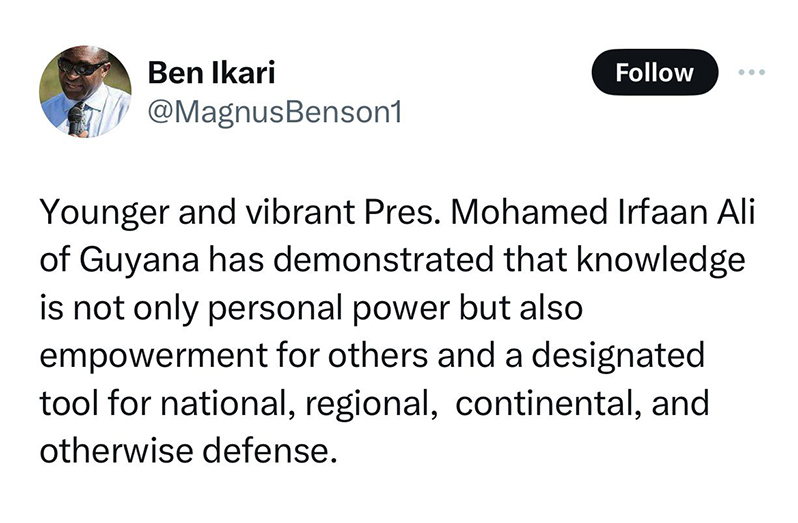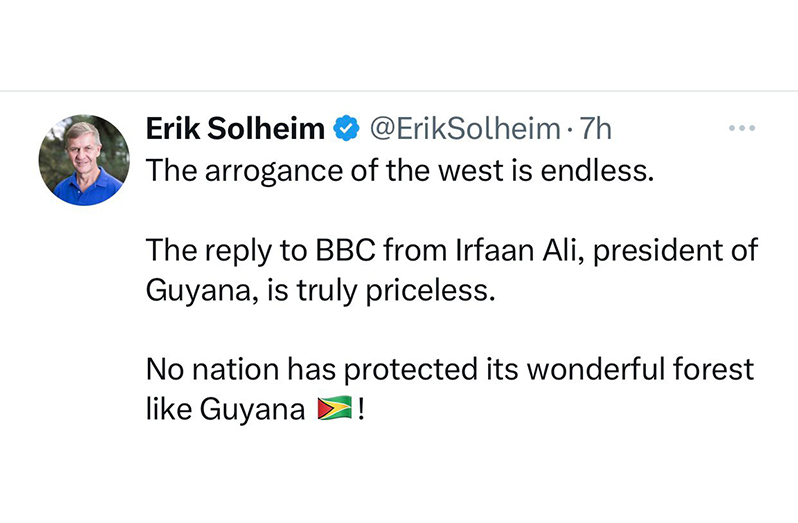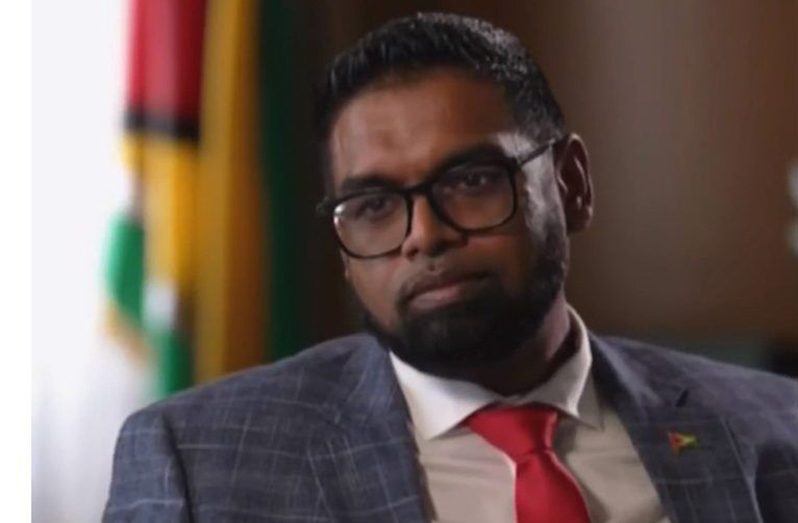–stakeholders back President Ali’s thrust; spur renewed focus on environmental justice
PRESIDENT Dr Irfaan Ali’s recent interview with BBC’s Stephen Sackur has garnered significant attention worldwide, as the Guyanese leader’s steadfast stance on climate change, environmental preservation, and his challenge to perceived Western hypocrisy has sparked a global conversation.
During the interview on BBC’s HARDtalk, Sackur questioned President Ali about whether Guyana’s focus on fossil-fuel extraction contradicts global efforts to combat climate change.
President Ali responded assertively, highlighting Guyana’s vast forest, which stores a significant amount of carbon, and its commitment to environmental stewardship.
“Let me stop you right there. Do you know that Guyana has a forest, forever[sic], that is the size of England and Scotland combined? A forest that stores 19.5 gigatons of carbon? A forest that we have kept alive?” he questioned.
Sackur further pressed President Ali on whether Guyana’s preservation of its vast forest, which stores a significant amount of carbon, justifies the decision to release carbon emissions through oil and gas extraction.

President Ali, in response, strategically flipped the script and put the question to the host: “Does that give you the right to lecture us on climate change?” adding: “I am going to lecture you on climate change.”
In challenging critics’ authority to criticise Guyana’s actions, President Ali highlighted Guyana’s environmental stewardship, which he said justifies its pursuit of oil and gas development, while maintaining a net-zero carbon footprint.
Sackur further questioned Guyana’s approach, referencing comments from Vice-President, Dr Bharrat Jagdeo expressing the urgency to extract oil amid the climate change imperative.
President Ali defended this stance as “practical” and “honest,” emphasising Guyana’s commitment to economic development and creating opportunities for its people.
He emphasised the country’s need to aggressively pursue its natural resources for economic growth and development, highlighting the lack of external support in bringing opportunities to Guyana.
“You can say we are rushing, but we are very practical. We have this natural resource. And we’re going to aggressively pursue this natural resource because we have to develop our country.
“We are committed to the development of this region. We have to create opportunities for our people because no one is bringing it out for us,” President Ali said.
Support for the Head of State’s stance poured in from around the world, with politicians, environmentalists, and advocates commending Guyana’s stance on its right to develop its resources responsibly while prioritising environmental sustainability.
GLOBAL VOICES
According to the global voices, developing states like Guyana reserve their sovereign right to utilise their resources for economic development, recognising that responsible exploitation can uplift communities, improve infrastructure, and enhance living standards.
Guyana, rich in resources like oil, gas, and rainforests, has been developing this resource to address historical underdevelopment and vulnerabilities.
Former Colombian Minister José Manuel Restrepo Abondano took to ‘X’ (formerly known as Twitter), praising President Ali’s response, criticising Western hypocrisy on climate issues and advocating for responsible resource exploitation.
“Brilliant answer! This is the way in which biased questions are answered that hide a lot of global hypocrisy, especially from actors who are part of developed countries that do little about this issue at a global level and are experts in pontificating,” Abondano said.
Former Minister of Climate and the Environment of Norway, Erik Solheim, also lauded President Ali’s defence of Guyana’s rainforest, declaring: “The arrogance of the West is endless. The reply to BBC from Irfaan Ali, President of Guyana, is truly priceless. No nation has protected its wonderful forest like Guyana.”
Ben Ikari, a human rights and environmental justice advocate, commended President Ali’s demonstration of knowledge and empowerment, stating: “Younger and vibrant President Mohamed Irfaan Ali of Guyana has demonstrated that knowledge is not only personal power but also empowerment for others and a designated tool for national, regional, continental, and otherwise defence.”
Theo Acheampong, an economist and political risk analyst from Ghana, echoed the sentiment, highlighting Guyana’s right to exploit its resources for development while remaining committed to climate goals.
He said: “Guyana, like any other developing country, has the right to exploit its natural resources, including oil and gas, for its development while keeping to its climate goals as one of the world’s remaining bio-sinks. There’s no inconsistency in this.”
Energy economist Asas Alhajji highlighted the potential historical significance of Guyana’s leadership in maintaining political stability and avoiding the resource curse while exploiting natural resources.
HISTORY BOOKS
He remarked: “The leadership of Guyana will go into history books and economic literature if they can do two things at once for the next 20 years: maintain political stability, avoid the resource curse.”
Furkan Gözükara from Türkiye criticised Western hypocrisy, pointing out the discrepancy in questioning Guyana’s emissions while overlooking other environmental issues.
“I can’t tolerate the shamelessness and hypocrisy of the western. They are asking Guyana about carbon emissions because they are going to extract their resources. Meanwhile, Israel’s destruction on Gaza is 1000x more harmful to the earth and atmosphere,” he said.
President Ali’s advocacy extends beyond the interview room, with the country’s presidency of the United Nations Security Council in February highlighting the intersection of climate change, food insecurity, and conflict.
President Ali, who chaired a crucial engagement, shed light on the overlooked consequences of war on agriculture and poverty, underscoring the importance of holistic approaches to global challenges.
Guyana has garnered international acclaim for its steadfast commitment to environmental sustainability and proactive stance in combating climate change.

Acknowledged by figures such as US envoy Linda Thomas-Greenfield and the World Bank’s Carlos Felipe Jaramillo, Guyana’s dedication to environmental priorities, including support for rural communities and forest conservation, stands as a beacon of progress.
Initiatives like contributing to the Regional Adaptation Fund and establishing a state-of-the-art biodiversity centre underscore Guyana’s resolve to balance economic growth with environmental preservation.
Moreover, Guyana’s ambitious development plans, exemplified by its historic $1.146 trillion 2024 budget, promise transformative changes to the country’s economic landscape.
With major projects like the gas-to-energy initiative and the Amaila Falls Hydro Project underway, Guyana aims to achieve energy sustainability while reducing reliance on fossil fuels.
Investments in alternative energy sources align with the nation’s goal of transitioning to 75 per cent renewable energy consumption by 2030, supporting inclusive growth and global sustainability objectives.
Additionally, Guyana is charting a course of regional leadership through initiatives such as the ’25 by 25′ plan to reduce CARICOM’s food-import bill and forging innovative financing models for environmental sustainability.
Economic forecasts predict unparalleled growth rates, with Guyana poised to experience a 38.2 per cent growth in 2024 and 15.2 per cent in 2025, the highest in the Caribbean.
However, amid these promising prospects, Guyana remains vigilant against the threats of climate change and environmental degradation, implementing comprehensive strategies and investing in renewable energy projects to secure a sustainable and prosperous future.




.png)









